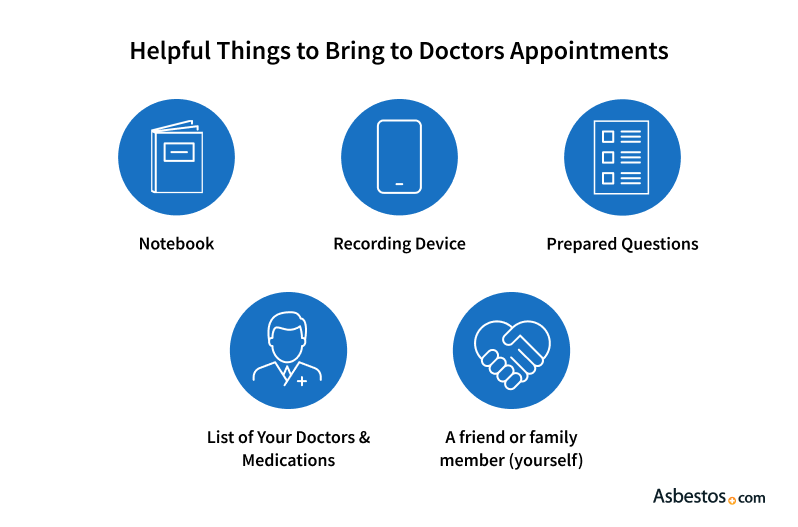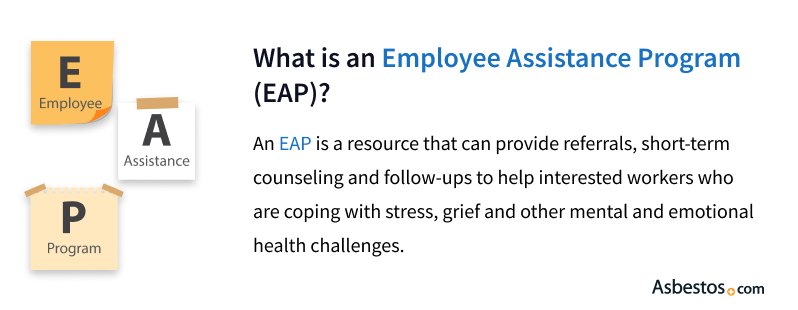Get in Touch
Have questions? Call or chat with our Patient Advocates for answers.
Being a caregiver for a loved one with mesothelioma isn't easy. They may have questions about what resources are available to support them as they try to offer the best possible care to their loved one. It's important for caregivers to communicate their needs and get the answers they need.

Written by Michelle Whitmer | Edited By Walter Pacheco | Last Update: July 24, 2024
Mesothelioma caregivers communicate with many people to coordinate care for their loved ones. They speak with family members, friends, patient advocates, co-workers, medical professionals and insurance companies to provide the best possible care. And they communicate with their loved one whose mesothelioma diagnosis has significantly affected them.
Clear and concise communication will help caregivers avoid misunderstandings. Aim for a plain, assertive and constructive communication style. When you’re kind and assertive, people are more likely to listen and help.
Asking the right questions when communicating with mesothelioma specialists, nurses and other medical professionals is key to understanding treatment and recovery. Make a list of all your questions ahead of time. Consider recording the appointment so you don’t have to write down every answer. Ask about booking a longer appointment to ensure all your questions are answered.
One of the most important communication roles for caregivers is advocating for the patient. This means making sure they get all the necessary medical care, support and assistance they need to maintain a good quality of life. This may involve speaking up at medical appointments if care is lacking or calling insurance companies to fight for coverage. Advocating for the patient can feel exhausting at times. It’s important for caregivers to get the support they need to cope.

Caregivers may encounter hurdles while navigating the health care system, but patient navigators can help. Many hospitals and cancer centers now employ patient navigators. They help patients and families understand the health care system and assist with insurance issues.
When someone you love has mesothelioma, it can be hard to know what to say. You may worry that bringing up anything related to the diagnosis will upset them.
It’s important for caregivers to communicate how much they care. Your actions can demonstrate this, but expressing the feelings with words may mean a lot to your loved one.
Asking the right questions of medical professionals can make all the difference when it comes to overcoming caregiving struggles. Open conversations can help you understand caregiver duties and know what to expect, though the responsibilities of a caregiver may vary depending on individual roles and relationships.
Bring something to take notes with during appointments. Doctor offices may also share handouts about helpful caregiver resources available online or in your area.
Being a mesothelioma caregiver involves a variety of challenges. Doing it alone is difficult. Make it a priority to educate yourself about caregiver resources and build a circle of support.
Mesothelioma caregivers may become so concerned with their loved one’s needs that they don’t attend to their own needs enough, which can lead to caregiver burnout. Your loved one’s cancer doctor or mesothelioma lawyer may be aware of unique resources in your area to avoid burnout. These can include support groups, respite care and support services.
In most cases, it takes more than one caregiver to assist someone with mesothelioma. Loved ones often divide tasks among family members. Spouses or adult children tend to take on a primary caregiving role, and this role requires a lot of support from secondary caregivers.
One-fifth of American workers must manage both jobs and caregiving responsibilities. Talking to your employer is the first step in finding suitable solutions to help balance work and caregiving. Depending upon where you work, you may be eligible for paid and unpaid time off and access to employee assistance programs.

The Family and Medical Leave Act of 1993, known as FMLA, ensures caregivers can take time off work to care for an immediate family member without the risk of losing their job. It allows eligible employees up to 12 weeks of unpaid leave to care for a seriously ill family member.
When primary caregivers aren’t getting enough help, they may consider hiring a professional caregiver. Deciding whether to hire a professional can be hard, but sometimes it’s necessary to provide the best care. Caregiver burnout is serious and can lead to health problems if not addressed quickly.
Recommended ReadingThank you for your feedback. Would you like to speak with a Patient Advocate?
Your web browser is no longer supported by Microsoft. Update your browser for more security, speed and compatibility.
If you are looking for mesothelioma support, please contact our Patient Advocates at (855) 404-4592
The Mesothelioma Center at Asbestos.com has provided patients and their loved ones the most updated and reliable information on mesothelioma and asbestos exposure since 2006.
Our team of Patient Advocates includes a medical doctor, a registered nurse, health services administrators, veterans, VA-accredited Claims Agents, an oncology patient navigator and hospice care expert. Their combined expertise means we help any mesothelioma patient or loved one through every step of their cancer journey.
More than 30 contributors, including mesothelioma doctors, survivors, health care professionals and other experts, have peer-reviewed our website and written unique research-driven articles to ensure you get the highest-quality medical and health information.
My family has only the highest compliment for the assistance and support that we received from The Mesothelioma Center. This is a staff of compassionate and knowledgeable individuals who respect what your family is experiencing and who go the extra mile to make an unfortunate diagnosis less stressful. Information and assistance were provided by The Mesothelioma Center at no cost to our family.LashawnMesothelioma patient’s daughter


Whitmer, M. (2024, July 24). Communication Strategies for Mesothelioma Caregivers. Asbestos.com. Retrieved July 26, 2024, from https://www.asbestos.com/support/caregivers/health-care-communication/
Whitmer, Michelle. "Communication Strategies for Mesothelioma Caregivers." Asbestos.com, 24 Jul 2024, https://www.asbestos.com/support/caregivers/health-care-communication/.
Whitmer, Michelle. "Communication Strategies for Mesothelioma Caregivers." Asbestos.com. Last modified July 24, 2024. https://www.asbestos.com/support/caregivers/health-care-communication/.
The Mesothelioma Center at Asbestos.com has provided patients and their loved ones the most updated and reliable information on mesothelioma and asbestos exposure since 2006.
Our team of Patient Advocates includes a medical doctor, a registered nurse, health services administrators, veterans, VA-accredited Claims Agents, an oncology patient navigator and hospice care expert. Their combined expertise means we help any mesothelioma patient or loved one through every step of their cancer journey.
More than 30 contributors, including mesothelioma doctors, survivors, health care professionals and other experts, have peer-reviewed our website and written unique research-driven articles to ensure you get the highest-quality medical and health information.
My family has only the highest compliment for the assistance and support that we received from The Mesothelioma Center. This is a staff of compassionate and knowledgeable individuals who respect what your family is experiencing and who go the extra mile to make an unfortunate diagnosis less stressful. Information and assistance were provided by The Mesothelioma Center at no cost to our family.LashawnMesothelioma patient’s daughter


Whitmer, M. (2024, July 24). Communication Strategies for Mesothelioma Caregivers. Asbestos.com. Retrieved July 26, 2024, from https://www.asbestos.com/support/caregivers/health-care-communication/
Whitmer, Michelle. "Communication Strategies for Mesothelioma Caregivers." Asbestos.com, 24 Jul 2024, https://www.asbestos.com/support/caregivers/health-care-communication/.
Whitmer, Michelle. "Communication Strategies for Mesothelioma Caregivers." Asbestos.com. Last modified July 24, 2024. https://www.asbestos.com/support/caregivers/health-care-communication/.
The Mesothelioma Center at Asbestos.com has provided patients and their loved ones the most updated and reliable information on mesothelioma and asbestos exposure since 2006.
Our team of Patient Advocates includes a medical doctor, a registered nurse, health services administrators, veterans, VA-accredited Claims Agents, an oncology patient navigator and hospice care expert. Their combined expertise means we help any mesothelioma patient or loved one through every step of their cancer journey.
More than 30 contributors, including mesothelioma doctors, survivors, health care professionals and other experts, have peer-reviewed our website and written unique research-driven articles to ensure you get the highest-quality medical and health information.
My family has only the highest compliment for the assistance and support that we received from The Mesothelioma Center. This is a staff of compassionate and knowledgeable individuals who respect what your family is experiencing and who go the extra mile to make an unfortunate diagnosis less stressful. Information and assistance were provided by The Mesothelioma Center at no cost to our family.LashawnMesothelioma patient’s daughter


Whitmer, M. (2024, July 24). Communication Strategies for Mesothelioma Caregivers. Asbestos.com. Retrieved July 26, 2024, from https://www.asbestos.com/support/caregivers/health-care-communication/
Whitmer, Michelle. "Communication Strategies for Mesothelioma Caregivers." Asbestos.com, 24 Jul 2024, https://www.asbestos.com/support/caregivers/health-care-communication/.
Whitmer, Michelle. "Communication Strategies for Mesothelioma Caregivers." Asbestos.com. Last modified July 24, 2024. https://www.asbestos.com/support/caregivers/health-care-communication/.
The Mesothelioma Center at Asbestos.com has provided patients and their loved ones the most updated and reliable information on mesothelioma and asbestos exposure since 2006.
Our team of Patient Advocates includes a medical doctor, a registered nurse, health services administrators, veterans, VA-accredited Claims Agents, an oncology patient navigator and hospice care expert. Their combined expertise means we help any mesothelioma patient or loved one through every step of their cancer journey.
More than 30 contributors, including mesothelioma doctors, survivors, health care professionals and other experts, have peer-reviewed our website and written unique research-driven articles to ensure you get the highest-quality medical and health information.
My family has only the highest compliment for the assistance and support that we received from The Mesothelioma Center. This is a staff of compassionate and knowledgeable individuals who respect what your family is experiencing and who go the extra mile to make an unfortunate diagnosis less stressful. Information and assistance were provided by The Mesothelioma Center at no cost to our family.LashawnMesothelioma patient’s daughter


Whitmer, M. (2024, July 24). Communication Strategies for Mesothelioma Caregivers. Asbestos.com. Retrieved July 26, 2024, from https://www.asbestos.com/support/caregivers/health-care-communication/
Whitmer, Michelle. "Communication Strategies for Mesothelioma Caregivers." Asbestos.com, 24 Jul 2024, https://www.asbestos.com/support/caregivers/health-care-communication/.
Whitmer, Michelle. "Communication Strategies for Mesothelioma Caregivers." Asbestos.com. Last modified July 24, 2024. https://www.asbestos.com/support/caregivers/health-care-communication/.
The Mesothelioma Center at Asbestos.com has provided patients and their loved ones the most updated and reliable information on mesothelioma and asbestos exposure since 2006.
Our team of Patient Advocates includes a medical doctor, a registered nurse, health services administrators, veterans, VA-accredited Claims Agents, an oncology patient navigator and hospice care expert. Their combined expertise means we help any mesothelioma patient or loved one through every step of their cancer journey.
More than 30 contributors, including mesothelioma doctors, survivors, health care professionals and other experts, have peer-reviewed our website and written unique research-driven articles to ensure you get the highest-quality medical and health information.
My family has only the highest compliment for the assistance and support that we received from The Mesothelioma Center. This is a staff of compassionate and knowledgeable individuals who respect what your family is experiencing and who go the extra mile to make an unfortunate diagnosis less stressful. Information and assistance were provided by The Mesothelioma Center at no cost to our family.LashawnMesothelioma patient’s daughter


Whitmer, M. (2024, July 24). Communication Strategies for Mesothelioma Caregivers. Asbestos.com. Retrieved July 26, 2024, from https://www.asbestos.com/support/caregivers/health-care-communication/
Whitmer, Michelle. "Communication Strategies for Mesothelioma Caregivers." Asbestos.com, 24 Jul 2024, https://www.asbestos.com/support/caregivers/health-care-communication/.
Whitmer, Michelle. "Communication Strategies for Mesothelioma Caregivers." Asbestos.com. Last modified July 24, 2024. https://www.asbestos.com/support/caregivers/health-care-communication/.
The Mesothelioma Center at Asbestos.com has provided patients and their loved ones the most updated and reliable information on mesothelioma and asbestos exposure since 2006.
Our team of Patient Advocates includes a medical doctor, a registered nurse, health services administrators, veterans, VA-accredited Claims Agents, an oncology patient navigator and hospice care expert. Their combined expertise means we help any mesothelioma patient or loved one through every step of their cancer journey.
More than 30 contributors, including mesothelioma doctors, survivors, health care professionals and other experts, have peer-reviewed our website and written unique research-driven articles to ensure you get the highest-quality medical and health information.
My family has only the highest compliment for the assistance and support that we received from The Mesothelioma Center. This is a staff of compassionate and knowledgeable individuals who respect what your family is experiencing and who go the extra mile to make an unfortunate diagnosis less stressful. Information and assistance were provided by The Mesothelioma Center at no cost to our family.LashawnMesothelioma patient’s daughter


Whitmer, M. (2024, July 24). Communication Strategies for Mesothelioma Caregivers. Asbestos.com. Retrieved July 26, 2024, from https://www.asbestos.com/support/caregivers/health-care-communication/
Whitmer, Michelle. "Communication Strategies for Mesothelioma Caregivers." Asbestos.com, 24 Jul 2024, https://www.asbestos.com/support/caregivers/health-care-communication/.
Whitmer, Michelle. "Communication Strategies for Mesothelioma Caregivers." Asbestos.com. Last modified July 24, 2024. https://www.asbestos.com/support/caregivers/health-care-communication/.
The Mesothelioma Center at Asbestos.com has provided patients and their loved ones the most updated and reliable information on mesothelioma and asbestos exposure since 2006.
Our team of Patient Advocates includes a medical doctor, a registered nurse, health services administrators, veterans, VA-accredited Claims Agents, an oncology patient navigator and hospice care expert. Their combined expertise means we help any mesothelioma patient or loved one through every step of their cancer journey.
More than 30 contributors, including mesothelioma doctors, survivors, health care professionals and other experts, have peer-reviewed our website and written unique research-driven articles to ensure you get the highest-quality medical and health information.
My family has only the highest compliment for the assistance and support that we received from The Mesothelioma Center. This is a staff of compassionate and knowledgeable individuals who respect what your family is experiencing and who go the extra mile to make an unfortunate diagnosis less stressful. Information and assistance were provided by The Mesothelioma Center at no cost to our family.LashawnMesothelioma patient’s daughter


Whitmer, M. (2024, July 24). Communication Strategies for Mesothelioma Caregivers. Asbestos.com. Retrieved July 26, 2024, from https://www.asbestos.com/support/caregivers/health-care-communication/
Whitmer, Michelle. "Communication Strategies for Mesothelioma Caregivers." Asbestos.com, 24 Jul 2024, https://www.asbestos.com/support/caregivers/health-care-communication/.
Whitmer, Michelle. "Communication Strategies for Mesothelioma Caregivers." Asbestos.com. Last modified July 24, 2024. https://www.asbestos.com/support/caregivers/health-care-communication/.
The Mesothelioma Center at Asbestos.com has provided patients and their loved ones the most updated and reliable information on mesothelioma and asbestos exposure since 2006.
Our team of Patient Advocates includes a medical doctor, a registered nurse, health services administrators, veterans, VA-accredited Claims Agents, an oncology patient navigator and hospice care expert. Their combined expertise means we help any mesothelioma patient or loved one through every step of their cancer journey.
More than 30 contributors, including mesothelioma doctors, survivors, health care professionals and other experts, have peer-reviewed our website and written unique research-driven articles to ensure you get the highest-quality medical and health information.
My family has only the highest compliment for the assistance and support that we received from The Mesothelioma Center. This is a staff of compassionate and knowledgeable individuals who respect what your family is experiencing and who go the extra mile to make an unfortunate diagnosis less stressful. Information and assistance were provided by The Mesothelioma Center at no cost to our family.LashawnMesothelioma patient’s daughter


Whitmer, M. (2024, July 24). Communication Strategies for Mesothelioma Caregivers. Asbestos.com. Retrieved July 26, 2024, from https://www.asbestos.com/support/caregivers/health-care-communication/
Whitmer, Michelle. "Communication Strategies for Mesothelioma Caregivers." Asbestos.com, 24 Jul 2024, https://www.asbestos.com/support/caregivers/health-care-communication/.
Whitmer, Michelle. "Communication Strategies for Mesothelioma Caregivers." Asbestos.com. Last modified July 24, 2024. https://www.asbestos.com/support/caregivers/health-care-communication/.
The Mesothelioma Center at Asbestos.com has provided patients and their loved ones the most updated and reliable information on mesothelioma and asbestos exposure since 2006.
Our team of Patient Advocates includes a medical doctor, a registered nurse, health services administrators, veterans, VA-accredited Claims Agents, an oncology patient navigator and hospice care expert. Their combined expertise means we help any mesothelioma patient or loved one through every step of their cancer journey.
More than 30 contributors, including mesothelioma doctors, survivors, health care professionals and other experts, have peer-reviewed our website and written unique research-driven articles to ensure you get the highest-quality medical and health information.
My family has only the highest compliment for the assistance and support that we received from The Mesothelioma Center. This is a staff of compassionate and knowledgeable individuals who respect what your family is experiencing and who go the extra mile to make an unfortunate diagnosis less stressful. Information and assistance were provided by The Mesothelioma Center at no cost to our family.LashawnMesothelioma patient’s daughter


Whitmer, M. (2024, July 24). Communication Strategies for Mesothelioma Caregivers. Asbestos.com. Retrieved July 26, 2024, from https://www.asbestos.com/support/caregivers/health-care-communication/
Whitmer, Michelle. "Communication Strategies for Mesothelioma Caregivers." Asbestos.com, 24 Jul 2024, https://www.asbestos.com/support/caregivers/health-care-communication/.
Whitmer, Michelle. "Communication Strategies for Mesothelioma Caregivers." Asbestos.com. Last modified July 24, 2024. https://www.asbestos.com/support/caregivers/health-care-communication/.
The Mesothelioma Center at Asbestos.com has provided patients and their loved ones the most updated and reliable information on mesothelioma and asbestos exposure since 2006.
Our team of Patient Advocates includes a medical doctor, a registered nurse, health services administrators, veterans, VA-accredited Claims Agents, an oncology patient navigator and hospice care expert. Their combined expertise means we help any mesothelioma patient or loved one through every step of their cancer journey.
More than 30 contributors, including mesothelioma doctors, survivors, health care professionals and other experts, have peer-reviewed our website and written unique research-driven articles to ensure you get the highest-quality medical and health information.
My family has only the highest compliment for the assistance and support that we received from The Mesothelioma Center. This is a staff of compassionate and knowledgeable individuals who respect what your family is experiencing and who go the extra mile to make an unfortunate diagnosis less stressful. Information and assistance were provided by The Mesothelioma Center at no cost to our family.LashawnMesothelioma patient’s daughter


Whitmer, M. (2024, July 24). Communication Strategies for Mesothelioma Caregivers. Asbestos.com. Retrieved July 26, 2024, from https://www.asbestos.com/support/caregivers/health-care-communication/
Whitmer, Michelle. "Communication Strategies for Mesothelioma Caregivers." Asbestos.com, 24 Jul 2024, https://www.asbestos.com/support/caregivers/health-care-communication/.
Whitmer, Michelle. "Communication Strategies for Mesothelioma Caregivers." Asbestos.com. Last modified July 24, 2024. https://www.asbestos.com/support/caregivers/health-care-communication/.
Mesothelioma Center - Vital Services for Cancer Patients & Families doesn’t believe in selling customer information. However, as required by the new California Consumer Privacy Act (CCPA), you may record your preference to view or remove your personal information by completing the form below.
